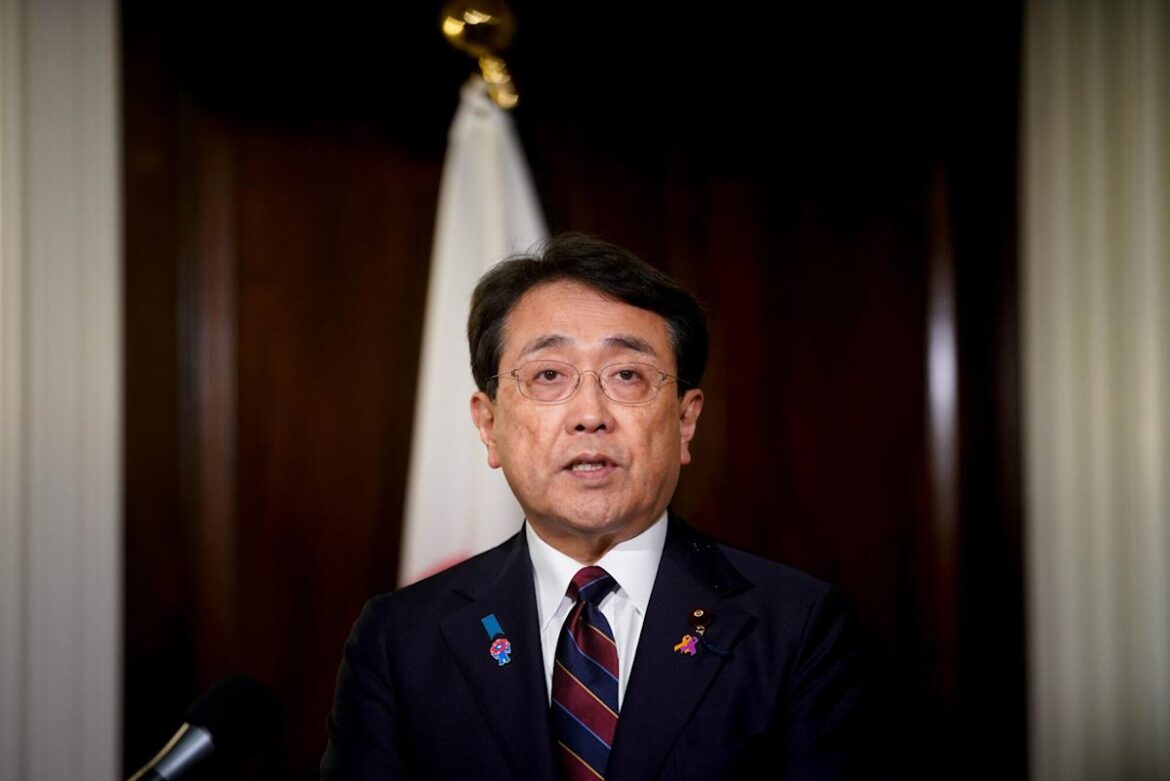(Bloomberg) — Supply Lines is a daily newsletter that tracks global trade. Sign up here.
Most Read from Bloomberg
Japan’s chief negotiator expressed hopes of reaching a trade agreement with the US in June, even as a media report indicated the two sides remained at odds on the key issue of its car exports.
Ryosei Akazawa said he’d had a frank meeting with US officials, including Treasury Secretary Scott Bessent, Trade Representative Jamieson Greer, Commerce Secretary Howard Lutnick. The talks — the second in the series — went on for more than two hours.
“We were able to have concrete discussions on topics such as expanding our bilateral trade, non-tariff measures, and cooperation on economic security,” Akazawa said to reporters on Thursday in Washington after the gathering. He added that the next round could come from mid-May onward.
The US proposed a framework under which Washington would maintain its 25% tariffs on Japan’s auto industry, as well as steel and aluminum, the Nikkei newspaper said, citing multiple sources close to the matter. Japan pushed back, saying the negotiations should be comprehensive, the paper said. Tokyo suggested reviewing its non-tariff barriers and expanding imports of US farm products, according to the Nikkei.
Concessions on auto tariffs are especially critical for Japan, as industries related to the auto sector employ about 8% of the country’s workforce. But the US sought to keep talks focused on the wider-ranging so-called “reciprocal” tariffs, which are set to come into effect in July.
Akazawa said he reiterated Japan’s stance that US President Donald Trump’s wide-ranging tariff campaign was “extremely regrettable” while repeating Tokyo’s plea that the tariff measures be revisited.
Meanwhile, a new angle on the talks emerged earlier Friday when Finance Minister Katsunobu Kato hinted at the possibility of citing Japan’s vast holdings of US Treasuries for leverage in discussions, although it’s unclear how serious he was about the idea.
“It does exist as a card,” said Kato, speaking in response to a question on a TV Tokyo program Friday. “Whether or not we use that card is a different decision.”
Kato’s remark struck a different tone from views expressed in April by the ruling party’s policy chief Itsunori Onodera, who said Japan, as an ally to the US, would not intentionally take action against US government bonds.
Story Continues
There’s no indication that the matter of Japan’s foreign reserves came up during Akazawa’s meeting in Washington. The participants didn’t discuss foreign exchange, national security or China, he said.
Akazawa said he hopes the acceleration in the negotiations will allow Trump and Japanese Prime Minister Shigeru Ishiba to reach an agreement in June.
“It is not simply a matter of speed, as there are national interests that must be protected on both sides, which will take some time,” Akazawa said. “There are still many issues that need to be addressed and resolved before a final agreement can be reached.”
The two leaders could meet for talks on the sidelines of the summit of the Group of Seven nations in Canada in mid-June before “reciprocal tariffs” come into effect in July.
Nations around the world are watching to see how Japan fares in its bid for a reprieve from tariffs that Trump hopes will close US trade deficits with its trading partners. India finalized terms of reference for a bilateral deal last week, Bloomberg reported, while Bessent said that Washington and Seoul could reach an “agreement of understanding” as soon as this week, though Seoul has said that is unlikely.
Akazawa said an agreement with the US will have to be a package deal.
Japan stands to be hit hard by US trade policies. A 25% levy on US imports of steel and aluminum started in March, with a similar tax on autos and a baseline 10% tariff on all goods kicking in earlier this month. The auto tariffs would hit the core of the nation’s industry in particular, although Trump took steps to ease the impact from those duties earlier this week.
“One Japanese carmaker is already losing $1 million an hour,” Akazawa said, without elaborating.
Protecting Japan’s interests and jobs will be crucial for Ishiba ahead of a national election in July. Last year cars and car parts accounted for a little over one-third of Japan’s exports to the US, its biggest export destination, while farmers have consistently offered strong support for his ruling Liberal Democratic Party in rural areas.
“Autos and agriculture are both important economic sectors with many people relying on them for their livelihoods,” Akazawa said. “It is entirely natural that some people may feel anxious about the Japan-U.S. negotiations, and we are fully aware of this. We have no intention of engaging in negotiations that would harm our national interests.”
–With assistance from Keiko Ujikane.
(Updates with details from domestic media report.)
Most Read from Bloomberg Businessweek
©2025 Bloomberg L.P.


AloJapan.com